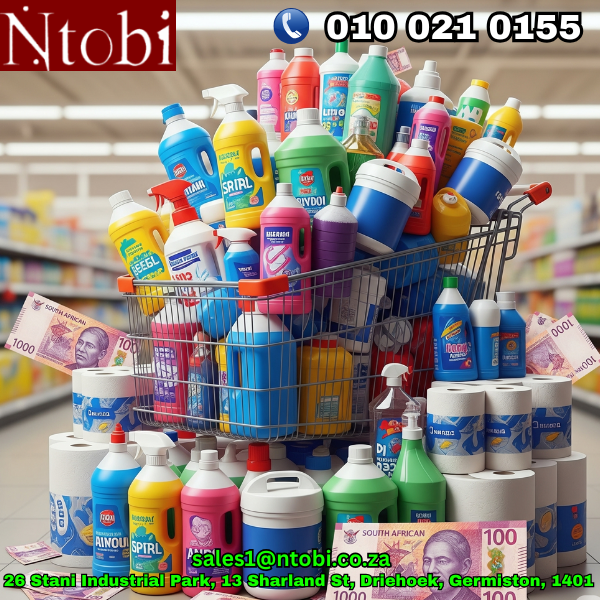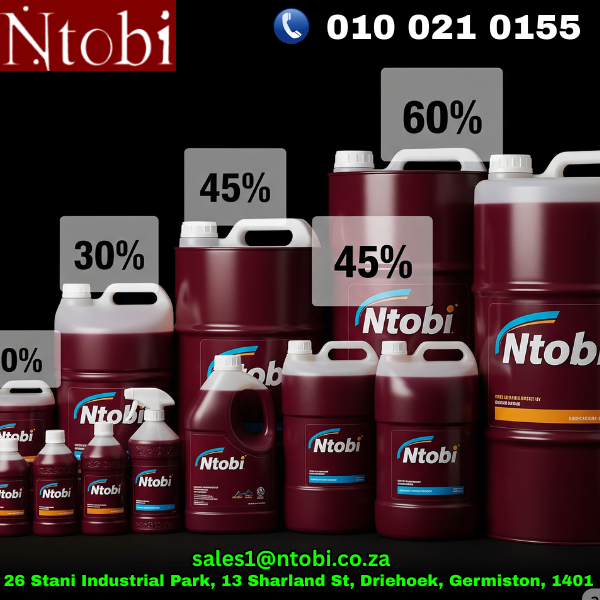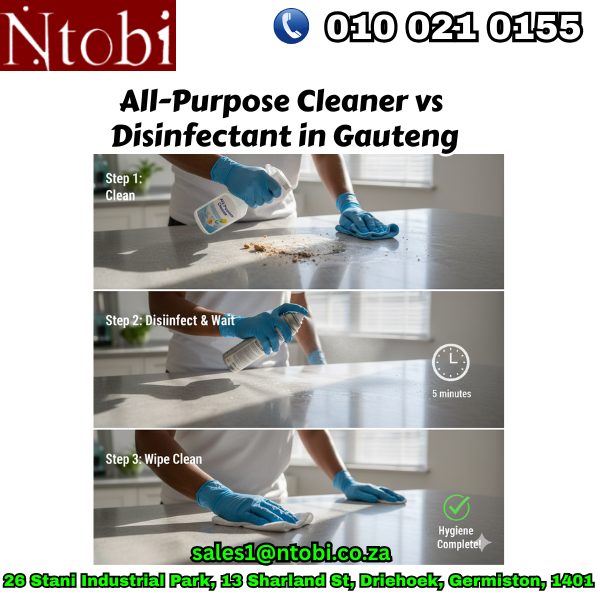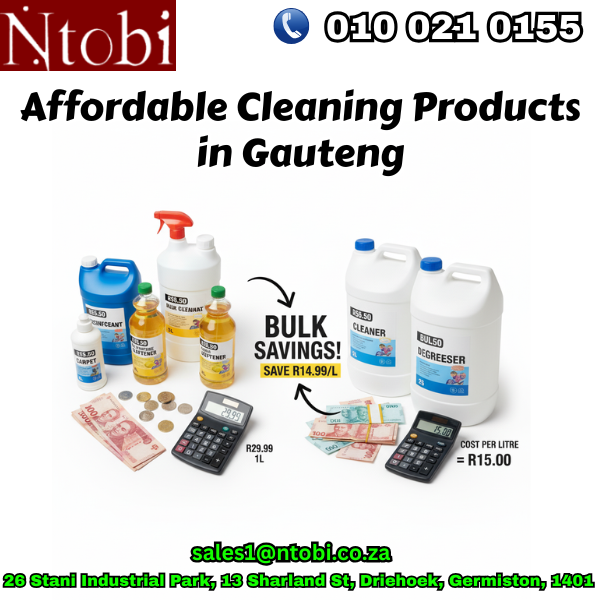Key Takeaways
| Benefit | Details |
| Cost Savings | Bulk purchasing reduces unit costs by 30-60% compared to retail prices |
| Convenience | Less frequent ordering and delivery scheduling |
| Quality Assurance | Professional-grade products unavailable in retail stores |
| Environmental Impact | Reduced packaging waste and transport emissions |
| Business Efficiency | Consistent supply chain for commercial operations |
Why Bulk Cleaning Supplies Make Financial Sense in South Africa
Purchasing cleaning supplies in bulk offers significant cost advantages for South African businesses and households alike. The mathematics are straightforward – buying larger quantities directly from suppliers eliminates retail markups whilst reducing per-unit costs substantially. This approach becomes particularly valuable given South Africa’s economic climate where every rand counts towards operational efficiency.
Ntobi Cleaning stands out as a leading supplier of bulk cleaning products, offering everything from heavy-duty floor cleaners to specialised industrial solutions. Their extensive range includes pine gels, disinfectants, and professional-grade cleaning chemicals that aren’t typically available through traditional retail channels. We’ve seen businesses reduce their cleaning supply costs by up to 45% when switching to bulk purchasing through established suppliers like Ntobi.
Understanding the South African Cleaning Supply Market
The cleaning supply industry in South Africa operates differently than many other sectors. Local manufacturers often sell directly to bulk purchasers, bypassing traditional retail distribution chains. This creates opportunities for savvy buyers to access wholesale pricing without needing massive order quantities.
Regional suppliers like those offering cleaning products in Boksburg understand local market dynamics. They stock products suited to South African conditions – from hard water formulations to solutions that work effectively in high-temperature environments. The key lies in finding suppliers who balance quality with competitive pricing.
Manufacturing costs in South Africa remain relatively low compared to imported alternatives. Local production also reduces currency exchange risks that affect imported cleaning products. Smart buyers leverage these advantages by establishing relationships with domestic suppliers who can provide consistent pricing structures.
Commercial Benefits of Bulk Purchasing
Businesses operating multiple locations find bulk purchasing particularly advantageous. Chain stores, office complexes, and manufacturing facilities consume substantial quantities of cleaning products monthly. Volume discounts from suppliers can dramatically impact bottom-line profitability.
Cash flow management improves when businesses purchase quarterly or bi-annually rather than monthly. This approach also reduces administrative overhead associated with frequent ordering and invoice processing. Many suppliers offer extended payment terms for bulk orders, further improving working capital management.
Storage considerations become important at commercial scale. Proper warehousing ensures product integrity whilst maximising shelf life. Most professional cleaning chemicals maintain effectiveness for 12-24 months when stored correctly, making bulk purchasing viable for even medium-sized operations.
Product Categories That Offer Maximum Savings
Different cleaning product categories show varying bulk discount potential. Industrial degreasers and specialised chemicals typically offer the highest savings margins – often 50-70% below retail pricing. These products have limited retail availability, forcing smaller buyers to pay premium rates.
High-Savings Categories:
- Industrial floor cleaners and degreasers
- Concentrated cleaning chemicals
- Disinfectants and sanitisers
- Specialised applications like pine gel products
General-purpose cleaners show more modest savings but remain worthwhile for high-volume users. Window cleaners, bathroom products, and kitchen degreasers typically offer 25-35% savings when purchased in bulk quantities.
Paper products (toilet rolls, paper towels) represent another high-savings category. These items have excellent storage characteristics and consistent demand patterns, making them ideal for bulk purchasing strategies.
Is it cheaper to buy cleaning supplies in bulk?
Absolutely – bulk purchasing delivers measurable cost reductions across virtually all product categories. The savings mechanism works through several factors: eliminated retail markups, reduced packaging costs per unit, and economies of scale in production and distribution.
Quantifying these savings requires comparing total cost of ownership rather than just purchase price. Bulk buyers often receive free delivery, extended warranties, and priority customer service. These value-adds compound the direct price savings significantly.
Typical savings by purchase volume:
- 5-10 units: 15-25% savings
- 20-50 units: 30-40% savings
- 100+ units: 45-60% savings
The calculation becomes more compelling when factoring in reduced shopping time and transport costs. Commercial buyers particularly benefit from consolidated delivery schedules that reduce labour costs associated with receiving and processing multiple smaller deliveries.
Some suppliers offer price-lock guarantees for bulk orders, protecting buyers from market fluctuations. This stability proves valuable during periods of raw material price volatility or currency fluctuation.
How to save money on cleaning supplies?
Smart purchasing strategies extend beyond simple bulk buying. Successful cost management requires understanding usage patterns, seasonal demand fluctuations, and supplier capabilities. We recommend conducting annual usage audits to identify optimisation opportunities.
Concentrate products offer exceptional value propositions. A single 5-litre concentrate container might replace 20-30 ready-to-use bottles, delivering both cost savings and storage efficiency. Training staff on proper dilution ratios ensures consistent results whilst maximising product yield.
Supplier consolidation creates additional leverage opportunities. Rather than purchasing from multiple vendors, concentrating spend with one or two preferred suppliers often unlocks tier-based pricing structures and improved service levels.
Money-saving strategies:
- Annual contracts with volume commitments
- Seasonal purchasing during low-demand periods
- Group purchasing with other businesses
- Direct manufacturer relationships
Generic or private-label products from established suppliers can deliver equivalent performance at reduced costs. Many industrial cleaning applications don’t require premium branded products, making generic alternatives sensible choices.
Storage and Inventory Management for Bulk Supplies
Proper storage infrastructure becomes critical when purchasing cleaning supplies in bulk. Chemical products require specific environmental conditions to maintain effectiveness and safety. Temperature control, moisture management, and proper ventilation protect both product integrity and workplace safety.
Inventory rotation using first-in-first-out principles prevents product degradation. Clear labelling systems help staff identify products approaching expiration dates. Many cleaning chemicals maintain effectiveness well beyond stated shelf lives when stored properly, but rotation systems ensure optimal performance.
Storage best practices:
- Climate-controlled environments for chemicals
- Separate storage for incompatible products
- Clear inventory tracking systems
- Regular stock audits and rotation
Safety considerations include proper ventilation, spill containment systems, and emergency response procedures. Bulk chemical storage requires compliance with local safety regulations and insurance requirements.
Investment in proper storage infrastructure pays dividends through reduced product loss and improved workplace safety. Many businesses find that storage costs represent only 2-3% of total bulk purchasing savings.
Finding Reliable Bulk Suppliers in South Africa
Supplier selection critically impacts bulk purchasing success. Reliable suppliers maintain consistent product quality, competitive pricing, and dependable delivery schedules. Local suppliers like Ntobi offer advantages through reduced lead times and better customer service accessibility.
Due diligence should include supplier financial stability assessment, quality certifications review, and reference checking with existing customers. Established suppliers typically offer product guarantees and technical support that prove valuable during implementation phases.
Regional coverage matters for businesses with multiple locations. Suppliers with nationwide distribution networks can provide consistent service levels across different geographic areas whilst maintaining standardised pricing structures.
Supplier evaluation criteria:
- Financial stability and business history
- Product quality certifications
- Delivery reliability and geographic coverage
- Technical support capabilities
- Competitive pricing structures
Building long-term supplier relationships creates mutual benefits through improved communication, priority service, and collaborative problem-solving. Many suppliers offer exclusive products or pricing to loyal customers.
Is it cheaper to make your own cleaning supplies?
Homemade cleaning solutions can reduce costs for specific applications, but rarely match the effectiveness and convenience of professional products. Simple applications like glass cleaners or mild degreasers work well with basic ingredients like vinegar and baking soda.
Commercial-grade cleaning requirements typically exceed homemade solution capabilities. Industrial degreasers, sanitisers, and specialised chemicals require precise formulations that aren’t feasible for DIY production. Professional products also meet regulatory requirements for commercial use.
Cost analysis must include labour time for preparation, storage requirements, and effectiveness comparisons. Most businesses find that bulk purchasing professional products delivers better value than DIY alternatives when total costs are considered.
DIY cleaning limitations:
- Inconsistent effectiveness
- Labour-intensive preparation
- Limited storage life
- Regulatory compliance issues
- Safety and liability concerns
For households, selective DIY cleaning can reduce costs for low-risk applications. However, businesses should prioritise professional products that ensure consistent results and regulatory compliance.
Professional cleaning products undergo rigorous testing for effectiveness, safety, and shelf stability. This quality assurance justifies the cost differential for most commercial applications.
Can you make money selling cleaning products?
The cleaning product distribution business offers profit opportunities for entrepreneurs willing to invest in proper infrastructure and customer development. Successful distributors focus on specific market segments or geographic regions where they can provide superior service.
Profit margins vary significantly based on product categories and target markets. Industrial cleaning chemicals typically offer higher margins than consumer products, but require more specialised knowledge and larger initial investments.
Market entry requires understanding regulatory requirements, supplier relationships, and customer needs. Many successful distributors start by serving local markets before expanding regionally.
Business considerations:
- Initial capital requirements for inventory
- Storage and handling infrastructure
- Regulatory compliance and insurance
- Customer acquisition and retention
- Competitive market dynamics
Success factors include product knowledge, reliable supply chains, and strong customer relationships. Many distributors add value through technical support, training, and customised solutions rather than competing solely on price.
The South African market offers opportunities for niche specialists who understand specific industry requirements. Sectors like hospitality, healthcare, and manufacturing have unique cleaning needs that create profitable service opportunities.

Do homemade cleaners really work?
Homemade cleaning solutions work effectively for many basic cleaning tasks but have significant limitations compared to professional products. Simple formulations using vinegar, baking soda, and dish soap can handle routine maintenance cleaning satisfactorily.
Effectiveness depends on understanding which ingredients work for specific cleaning challenges. Acidic solutions like vinegar excel at removing mineral deposits, whilst alkaline solutions like baking soda work better on grease and organic soils.
Effective homemade combinations:
- Vinegar and water for glass and mirrors
- Baking soda paste for scrubbing applications
- Dish soap solutions for general cleaning
- Hydrogen peroxide for sanitising
Professional products offer advantages through specialised formulations, consistent concentrations, and proven effectiveness testing. Commercial applications typically require this reliability to meet cleanliness standards and regulatory requirements.
Safety considerations become important with homemade solutions. Mixing incompatible chemicals can create dangerous reactions. Professional products include safety data sheets and usage instructions that ensure safe application.
For cost-conscious households, selective use of homemade cleaners can reduce expenses whilst maintaining cleanliness standards. However, critical applications like sanitising and heavy-duty cleaning benefit from professional products.
Frequently Asked Questions
Q: What minimum quantities qualify for bulk pricing?
A: Most suppliers offer bulk pricing starting at 10-20 units, with deeper discounts available for larger quantities. Professional suppliers like Ntobi often accommodate smaller businesses with reasonable minimum orders.
Q: How long do bulk cleaning supplies last in storage?
A: Most cleaning chemicals maintain effectiveness for 12-24 months when stored properly. Concentrates often have longer shelf lives than ready-to-use products.
Q: Are there financing options for bulk purchases?
A: Many suppliers offer payment terms ranging from 30-90 days for established customers. Some provide lease arrangements for very large orders.
Q: What safety requirements apply to bulk chemical storage?
A: Storage requirements include proper ventilation, spill containment, temperature control, and compliance with local safety regulations. Consult your supplier for specific guidance.
Q: Can small businesses benefit from bulk purchasing?
A: Yes, even small businesses can achieve significant savings through group purchasing arrangements or by focusing on high-usage items where bulk discounts justify larger orders.
For more information about bulk cleaning supplies in South Africa, contact Ntobi Cleaning or visit their location in Boksburg.
Search Reference: This comprehensive guide covers cost-effective bulk cleaning supplies throughout South Africa, helping businesses and households make informed purchasing decisions whilst maximising value.







Leave a Reply